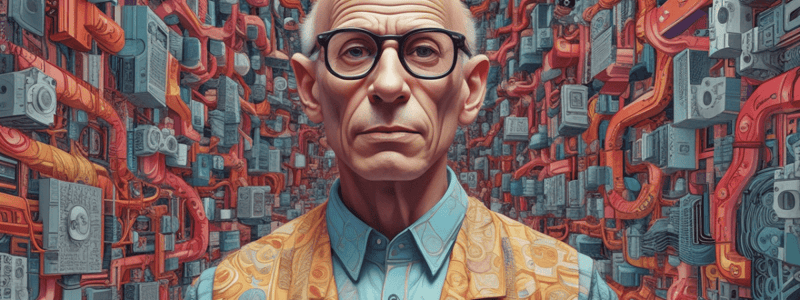Podcast
Questions and Answers
According to Foucault, how are power and knowledge related?
According to Foucault, how are power and knowledge related?
- They are separate entities
- Power is dependent on knowledge
- Knowledge is subordinate to power
- They are two sides of the same coin (correct)
What did Foucault argue power is, in addition to being something one entity holds over another?
What did Foucault argue power is, in addition to being something one entity holds over another?
- A tool for domination
- An oppressive force
- An individual's authority
- A network of relations and discourses (correct)
In Foucault's view, how does power produce knowledge?
In Foucault's view, how does power produce knowledge?
- Through the institutional structures and discourses in society (correct)
- By circumscribing acceptable behavior
- Through surveillance and control
- By enforcing strict rules
Which term did Foucault use to describe institutions like prisons, schools, hospitals, and militaries?
Which term did Foucault use to describe institutions like prisons, schools, hospitals, and militaries?
How did Foucault view the circulation of power?
How did Foucault view the circulation of power?
What did Foucault consider knowledge to be?
What did Foucault consider knowledge to be?
What did Foucault emphasize as the source of power?
What did Foucault emphasize as the source of power?
According to Foucault, what role does discourse play in the exercise of power?
According to Foucault, what role does discourse play in the exercise of power?
How did Foucault view the relationship between truth, power, and knowledge?
How did Foucault view the relationship between truth, power, and knowledge?
In Foucault's perspective, how does power operate in society?
In Foucault's perspective, how does power operate in society?
What impact has Foucault's concept of power and knowledge had on society?
What impact has Foucault's concept of power and knowledge had on society?
How does Foucault's work contribute to understanding power relations?
How does Foucault's work contribute to understanding power relations?
Flashcards are hidden until you start studying
Study Notes
Foucault's Concept of Power and Knowledge
Michel Foucault (1926-1984) was a renowned French philosopher, social theorist, and historian of ideas known for his work on the history of sexuality and the relationship between power and knowledge. His ideas, as outlined in works such as "Power/Knowledge" and "Discipline and Punish," have had a significant impact on the fields of philosophy, sociology, and political theory.
Foucault's concept of power and knowledge is based on the idea that power and knowledge are inextricably linked, and that each is a function of the other. He argued that power is not just something that one entity holds over another, but rather that it is a network of relations and discourses that permeate society.
The Interplay of Power and Knowledge
Foucault maintained that power and knowledge are not separate entities, but rather two sides of the same coin. In his view, knowledge is a form of power, and power is a form of knowledge. This relationship is not one of simple cause and effect, but rather one of mutual constitution. Power produces knowledge, and knowledge produces power. This interplay is most evident in the institutions that Foucault referred to as "disciplinary societies," such as prisons, schools, hospitals, and militaries.
The Circulation of Power
For Foucault, power is not just something that is possessed by a few individuals or groups. Instead, he saw it as something that circulates and functions through a network of relations. He argued that power is not just something that is imposed from above, but rather that it arises from below, from the discourses and values that are embedded in our daily lives. This means that we are all complicit in the exercise of power, even as we are subjected to its effects.
The Role of Discourse
Foucault also emphasized the role of discourse in the exercise of power. He believed that discourse is not just a means of transmitting information, but also a tool of power. Discourse is used to shape our understanding of the world, to create knowledge, and to justify power relations. This means that power is not just something that is exercised through force or coercion, but also through the production of knowledge and the shaping of discourse.
Historical and Societal Truth
For Foucault, truth is not something that exists independently of power and knowledge, but rather something that is produced through the interaction of these two forces. He argued that truth is a social construct, shaped by the discourses and power relations of a given society. This means that truth is not a fixed or objective reality, but rather a product of historical and societal contexts.
The Impact of Power and Knowledge
Foucault's concept of power and knowledge has had a profound impact on the study of power relations and the role of knowledge in society. His ideas have been used to analyze a wide range of topics, from the history of sexuality to the role of power in modern institutions. His work has also influenced debates about the nature of truth, the role of discourse in shaping knowledge, and the ways in which power operates in society.
In conclusion, Foucault's concept of power and knowledge provides a unique perspective on the relationship between power and knowledge, and the role of discourse in shaping our understanding of the world. His ideas have had a significant impact on the fields of philosophy, sociology, and political theory, and continue to be relevant in the study of power relations and the production of knowledge in society.
Studying That Suits You
Use AI to generate personalized quizzes and flashcards to suit your learning preferences.




